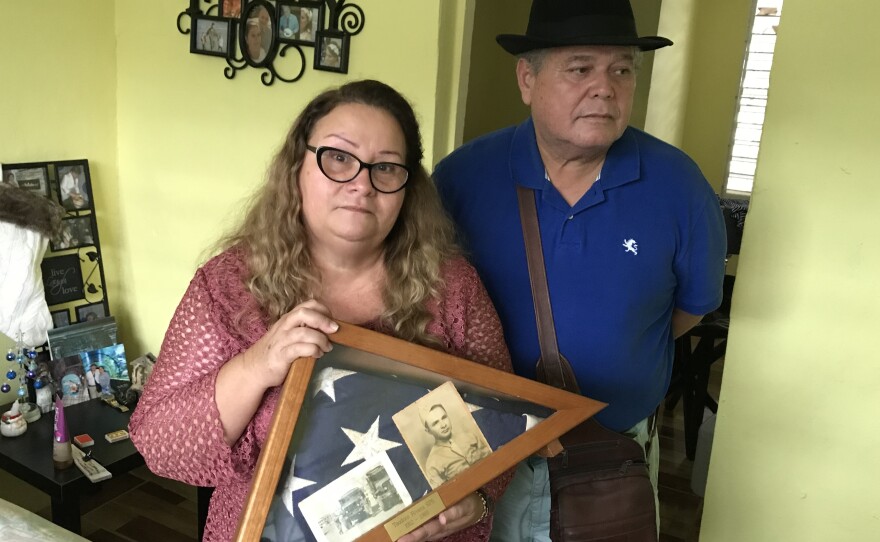Like many in Puerto Rico, Irma Rivera Aviles and her husband Ivan Martínez weathered Hurricane María in a shelter at the Ramón B. López vocational school in Cataño, a town several miles west of San Juan, along with nearly 200 others. Conditions quickly got bad at the shelter and she was angry when she spoke with NPR in September.
"The governor needs to come here and take a look at our critical situation" she said a few days after the storm, "the bathrooms are flooded and aren't working. The generator is broken and we are here in the dark. We desperately need water, power and ice."
During the hurricane, 5 feet of water surged through their neighborhood, a section in Cataño called El Pueblito. It's a tight-knit working-class community. Rivera Aviles and Martínez had evacuated by then, but some of their neighbors had to be rescued from the floodwaters.
After spending more than a week in the shelter, they came back home as soon as the roads were clear. Nothing could have prepared them for what they found.
"I was shocked when I walked in," Ivan Martínez says. "My life crumbled, we were hard hit." But he says it hit his wife even worse, "she spent the next couple of weeks crying and crying."
Irma Rivera Aviles doesn't cry as much now. She's trying to look forward, to getting her home repaired but it hasn't been easy. And though their livelihood has been unraveled by the hurricane, some level of normalcy is returning to Rivera Aviles's life, even if only for a few hours a day.
"When I'm working, I stop thinking about what happened to me," says the 66-year-old grandmother. "When I get home, of course, my reality is still there."
Sitting in her cubicle at the loans department of the Puerto Rico Teachers retirement system, she says work is the best therapy "to help me stay positive."
Rivera Aviles cherishes her colleagues' kindness, because "sometimes they share homecooked food with me." Rivera Aviles and her husband Ivan Martínez have not cooked in more than two months. They don't have a working kitchen at home.
"This was our house"
Daily life for Irma Rivera Aviles and Ivan Martínez is still a struggle.
The couple is out of the shelter now and living in Rivera Aviles's sister's home — next to the couple's home in Cataño. But the temporary house isn't finished and it doesn't have running water or working toilets. For that, they have to go back to their damaged home.
"My life changed completely," she says, as even simple things became harder. "Your biological clock says you need to use the bathroom at two in the morning. With fear, I wake up Ivan and he takes me to the bathroom" in their damaged home next door. Now, María Rivera Aviles has a new routine – no eating or drinking after 7 p.m.
There's no power at their home or anywhere in her neighborhood. With no power, a major concern each day is finding ice to keep insulin chilled. Ivan Martínez is diabetic and he's also a liver transplant survivor.
"This was our house," says Rivera Aviles with sadness on her face as she stands in front of her now uninhabitable home. "That in the corner is a guanabana tree," she says pointing to the right in her courtyard. "My mom planted this tree and it makes me very sad to look at it now."
Her guanabana tree is brown and bare. Debris litters her yard. A few iguanas roam around.
Step into Rivera Aviles's home and there's a strong musty smell.
"See, mold is growing everywhere," she says, pointing to the living room walls. It's dark inside. It's a small house filled with boxes and tarp-covered furniture. "We have some boxes here and I haven't had the strength to open them. I start crying every time I see wet pictures."
The storm blew off part of the roof and everything gets wet every time it rains. The roof now has a blue tarp on it, but it has holes. The house is paid for but it's uninsured.
As she walks into her bedroom, Rivera Aviles steps around piles of mildewed clothes that need to be thrown out.
She removes a tarp from her dresser.
"Family pictures and my jewelry," she says. "It all has sentimental value." She's been putting off dealing with all this.
"All my life memories"
Rivera Aviles and her husband are trying to get their home repaired but it hasn't been easy. The couple, like many of their neighbors, is still waiting for rebuilding money from FEMA.
"I don't have much hope for FEMA," Martínez says. The couple submitted their application on the Internet, "but you don't see much movement, there is no explanation." FEMA visited them and delivered blue tarp, but they haven't heard much else from the agency.
When they tried to buy zinc roofing recently, they were told none was available. It's still at the port. Meanwhile, their home continues to leak whenever it rains, but one white plastic box that's very special to Rivera Aviles remains dry.
"These are all my Christmas decorations" she says, her voice trembling with emotion. "They survived...all my life memories."
Looking at her Christmas ornaments bring back memories of happier times. Yet, Rivera Aviles feels lucky. She knows many people were hit harder than she. Hurricane María left many problems in Cataño – one of the bigger ones after the lack of electricity is crime. Their neighborhood, El Pueblito, goes dark at 7 p.m. A neighboring family had their generator stolen.
Rivera Aviles says she and her husband haven't bought a generator out of fear that it would make them a target.
"We don't feel safe here," she explains. "We didn't lock our doors before and now, locked gates aren't enough to make me feel safe."
Rivera Aviles says, once night falls, coqui — the tiny tree frogs — start singing and people go inside. She's grateful for what she calls the coqui nightly concert. They help keep her grounded.
About two dozen of the couple's friends, fed up with the daily struggle and crime post María, left for the U.S. mainland. Next year she'll mark her 30th work anniversary and she's thinking of retiring then. When she does, Rivera Aviles says she and her husband may follow their friends.
Copyright 2017 NPR. To see more, visit http://www.npr.org/.






